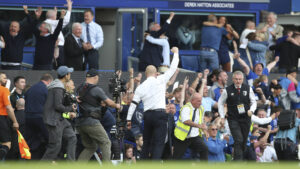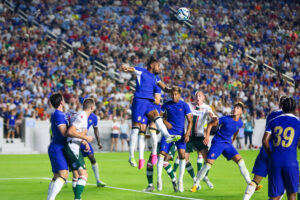Martin O’Neill was guilty of epic understatement earlier this week when he said after Ireland’s 1-0 defeat to Wales in the Nations League: “We’re not renowned for scoring a lot of goals, so we need to take the chances when they come”. Right now, Ireland are hardly renowned for scoring at all, having managed only five goals in their past nine games. If that scoring rate (if it can be described as such) continues, Ireland will not only be relegated from their Nations League group, which they are currently bottom of, but they will struggle to qualify for Euro 2020.
Will Ireland Ever Find Another Goal-Scorer?
A Severe Lack of Quality
It’s not hard to establish the cause of Ireland’s current goal drought – quite simply, they lack a striker of genuine international quality. Although they started with two forwards against Wales, neither Aiden O’Brien of Millwall nor Callum Robinson of Preston are of Premier League standard (both their clubs are in the bottom five of the Championship), let alone anything higher. And beyond them, Ireland’s striking resources are thin indeed: Jon Walters of Ipswich is another striker whose club are languishing near the bottom of the Championship table and, while Shane Long may be with Southampton in the Premier League, he is hardly playing for them and is certainly not scoring for them.
Essentially, Ireland have failed to find anyone to replace Robbie Keane since he retired after Euro 2016, having set an Irish goal-scoring record that, if the country’s current strikers are anything to go by, might last for decades. In nearly 20 years with the national team, Keane played in 146 matches and scored a truly impressive 68 goals (the same number of international goals as the great Gerd Muller, albeit that Muller got his 68 goals in just 62 internationals for West Germany).
Throughout his time with Ireland, Keane consistently scored enough goals to enable Ireland at least to challenge for qualification for global and continental tournaments, and on three occasions (the 2002 World Cup and the Euros in 2012 and 2016) he helped Ireland to make it all the way to a major finals. The highlight of his international career was his performance at the 2002 World Cup in Japan and South Korea, when he scored three goals in four games, including a late equaliser against Germany in the group stage that was the only goal Die Nationalmannschaft conceded until the original Ronaldo got two against them in the final.
An Exception
The fact that it took Ireland another ten years to make another major tournament (Euro 2012, where they lost all three games in a fearsome group that contained Spain, Italy and Croatia) meant that Keane never got another chance to play in a major finals when he was at his peak for Spurs. Nevertheless, he still found the back of the net sufficiently often to guarantee Ireland at least a chance in tight games, like the one against Wales in the Nations League, which is a quality that they now seem to lack completely.
Taking a longer-term view, Keane is very much the exception to the rule, the rule being that Ireland traditionally do not produce high-quality strikers. What sums up Keane’s exceptionalism is that his total of 68 goals for Ireland is greater than the combined totals of the next three highest scorers for the Republic: Niall Quinn (who scored 21 goals in 92 internationals), Frank Stapleton (who scored 20 in 71) and Don Givens (who scored 19 in 56).
Past Glories
Of course, for most of the 20th century, Ireland were the poor relation of the five national teams from the British and Irish isles. It was only when Jackie Charlton became the national manager in 1986 that Ireland, which had long produced such truly great players as Johnny Giles, David O’Leary and Liam Brady, finally began to punch its weight at international level, qualifying for Euro 1988 and two World Cups (Italia 1990 and USA 1994).
The irony is, of course, that even that Ireland team of 1986 to 1996, which contained such luminaries in defence and midfield as Mark Lawrenson, Ronnie Whelan, Paul McGrath and Ray Houghton, still could not score many goals, as it lacked a truly predatory striker. Stapleton was already past his peak when Charlton took over, so it was left to the likes of Quinn and Tony Cascarino to play as forwards whose main role was similar to that of Olivier Giroud in France’s World Cup-winning side this summer, namely to hold the ball up and bring better goal-scorers into the game.
Consequently, it could easily be argued that Ireland’s current paucity of striking talent is the norm for the country and that it is the lack of high-quality attacking talent from midfield and the wings that is the real problem. Of the side that played against Wales, it is only the wingbacks, James McLean of Stoke and Matt Doherty of Wolves (who, like his club, has had such an impressive start to the season), who carry any real goal-scoring threat, and if a team is relying on its wingbacks to score then it really is in trouble.
No Sign of Improvement
Unfortunately, the striking (or rather, lack of striking) situation is extremely unlikely to improve, at least in the short term. The forwards in the current under-21 set-up are all playing at an even lower league level in England than their senior counterparts, as they turn out for the likes of Crawley and Portsmouth, and one of them (Ronan Hale) is still plying his trade in the Irish League for Derry City.
It could well be that Ireland’s inability to score goals (and on occasions even to create chances) ultimately does for the O’Neill-Roy Keane managerial partnership, which did so well in leading Ireland to the knockout stages of Euro 2016, where they briefly led against France before they eventually lost 2-1. However, even if the pair are replaced, as some in Ireland are calling for, any successor will surely be unable to significantly boost the team’s scoring potential, or at least that of the front line. For the time being, whoever the manager is Ireland are highly unlikely to qualify for another major tournament, let alone repeat their achievement of reaching the last 16 of Euro 2016.
There is one world-class finisher in Ireland, but sadly for O’Neill and Keane, he is Jacob Stockdale, who plays rugby football rather than association football. Last season, which was his debut season with the Irish national side, Stockdale set a new record for try-scoring in the Six Nations Championship, scoring seven in total, including an absolute classic against England at Twickenham. How Irish football fans must long for a striker who is even half as clinical.
Main Photo






